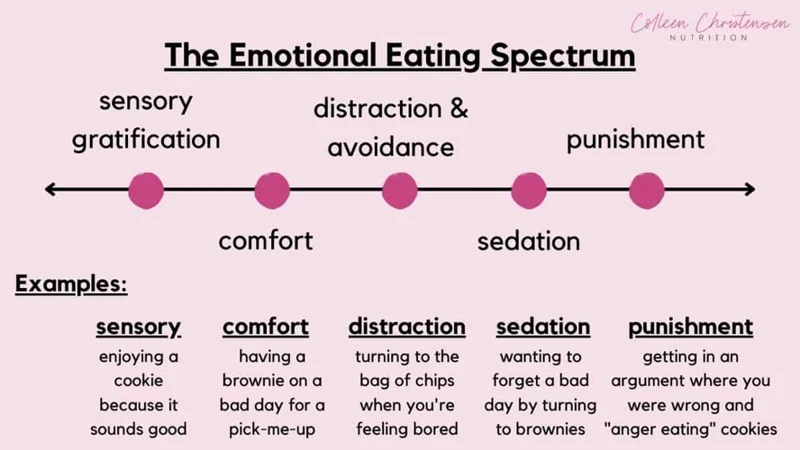The Problem with Boredom Eating

It’s no secret that many people turn to food when they’re bored. While this may seem like a harmless habit, it can actually lead to some serious health problems over time. Boredom eating, also known as emotional eating or stress eating, can be a slippery slope that leads to weight gain, poor nutrition, and other negative consequences.
One of the main issues with boredom eating is that people tend to choose unhealthy foods when they’re not really hungry. They reach for snacks that are high in sugar or fat, such as candy, chips, or cookies, instead of more nutritious options like fruits or vegetables. This can lead to weight gain and other health problems over time, especially if it becomes a regular habit.
Another problem with boredom eating is that it can become a coping mechanism for dealing with stress or negative emotions. People often turn to food as a way to distract themselves from their problems or to feel better when they’re feeling down. This can create a cycle where they rely on food to regulate their mood, which can be difficult to break out of.
Boredom eating can be a serious problem that can have long-term consequences for your health and wellbeing. Understanding the science behind this behavior and developing strategies to overcome it can be key to improving your overall health and quality of life.
Understanding the Science

As we try to navigate the tricky landscape of boredom eating, it’s important to understand the scientific factors that contribute to it. By examining the underlying mechanisms driving our food cravings, we can develop targeted strategies for overcoming them. In this section, we will explore two key aspects of the science behind boredom eating: the role of dopamine, a neurotransmitter involved in our brain’s reward system, and the impact of stress on our food choices.
The Role of Dopamine
One of the primary reasons for boredom eating lies in the brain’s complex reward system involving a neurotransmitter called dopamine. Dopamine is responsible for providing the brain with a feeling of pleasure and reward when we engage in certain activities like eating, exercising, or socializing.
However, when we indulge in these activities too frequently, our brain becomes desensitized to dopamine. This leads to a decrease in dopamine receptors, which means we end up needing more dopamine to feel the same level of pleasure or reward. This can result in overeating, creating an unhealthy cycle of reward-seeking behavior.
Studies have also shown that certain foods high in sugar and fat can stimulate the release of dopamine, leading to an even greater desire for these foods. This mechanism can compound the issue of boredom eating, as the brain craves the dopamine release associated with eating these unhealthy foods.
Additionally, stress can further disrupt the brain’s reward system by increasing the release of cortisol, a hormone that can interfere with dopamine production. As a result, individuals may turn to comfort eating as a way to cope with stress, leading to further overeating.
Understanding the role of dopamine in the brain’s reward system can help us become more aware of our own behaviors and cravings. It’s important to find healthier ways to stimulate dopamine release, such as through exercise or engaging in enjoyable activities.
The Impact of Stress
Stress is one of the major contributors to boredom eating. When we are stressed, our body releases a hormone called cortisol which triggers our body’s fight or flight response. This response can make us feel hungry, even if we have already eaten, and can cause us to crave unhealthy foods.
Here are some of the ways that stress impacts our eating habits:
- Increased appetite: As mentioned, cortisol can trigger our body to release hunger hormones and make us feel like we need to eat, even if we are not hungry. This can lead to overeating and poor food choices.
- Cravings for unhealthy foods: When we are stressed, we tend to crave foods that are high in sugar, fat, and salt. This is because these types of foods trigger the release of dopamine, a neurotransmitter that is associated with pleasure and reward.
- Emotional eating: Stress can also trigger emotional eating, which means that we turn to food as a way to cope with our emotions. This can be a vicious cycle, as we may feel guilty or ashamed after overeating, which can then lead to more stress and more emotional eating.
To combat the impact of stress on boredom eating, try the following strategies:
- Practice stress-reducing activities: Engage in activities like yoga, meditation, or deep breathing exercises to lower your stress levels and reduce cortisol production.
- Find healthy ways to cope: Instead of turning to food when you feel stressed, find other ways to cope with your emotions, such as going for a walk or talking to a friend.
- Get enough sleep: Lack of sleep can increase cortisol levels and make it more difficult to resist cravings and practice self-control.
By understanding the impact of stress on boredom eating and implementing strategies to combat it, we can regain control over our eating habits and achieve our health goals.
Strategies for Overcoming Boredom Eating
Now that we understand the science behind boredom eating, it’s time to dive into some effective strategies for overcoming it. It can be challenging to control the impulse to snack when feeling bored, but with the right tools and mindset, it’s possible to make positive changes. Below are several proven methods for addressing boredom eating and creating a healthier relationship with food. By implementing these practices, you can learn how to harness your willpower and feel in control of your eating habits.
Find New Hobbies
One effective strategy for overcoming boredom eating is to find new hobbies that can keep you engaged and distracted. This can not only help you avoid snacking out of boredom, but it can also provide you with a sense of fulfillment and satisfaction that can improve your overall well-being. Here are a few ideas:
- Engage in physical activities: Starting a new exercise routine or trying out a new sport can be a great way to channel your energy and stay active.
- Pick up a creative hobby: Activities like drawing, painting, and writing can provide a creative outlet and help you express yourself.
- Learn a new skill: Take an online course in a subject that interests you, such as cooking, photography, or coding.
- Volunteer for a cause: Find an organization in your community that aligns with your values and donate your time and skills to help others.
- Find a new social activity: Join a book club, attend a fitness class, or find a group of like-minded individuals that share your interests.
By engaging in these activities, you can shift your focus away from the urge to snack and towards productive and fulfilling activities that can improve your overall well-being. It’s important to keep in mind that finding new hobbies may take some effort and exploration, but the benefits of replacing boredom eating with healthier behaviors can be worth the effort.
Plan Ahead
When it comes to boredom eating, one of the most effective strategies is to plan ahead. This means making thoughtful decisions about what you will eat before boredom strikes. Here are a few tips for successful planning to tackle boredom eating:
- Prepare healthy snacks: It’s important to have healthy snacks on hand, so you don’t resort to junk food when you’re bored. Prepare fruits and vegetables in advance, and have them ready in the fridge. Consider also prepping some healthy dips like hummus or tzatziki to add flavor to those snacks.
- Create meal plans: Plan out meals in advance to prevent impulse eating. This can be as simple as jotting down a few meal ideas for the week. Make sure to include a balance of protein, healthy fats, and carbohydrates to keep you feeling satiated.
- Keep a food journal: Keeping track of what you eat can help you become more aware of your eating habits, and help prevent boredom eating. This can be as simple as writing down what you eat and when you eat it.
- Set specific meal times: It’s important to establish specific meal times so you are less likely to snack out of boredom. If you know that you have breakfast scheduled for 7:00 am, lunch at 12:00 pm, and dinner at 6:00 pm, you will be less inclined to snack throughout the day.
Planning ahead can be a very effective way to overcome boredom eating. By preparing healthy snacks, creating meal plans, keeping a food journal, and setting specific meal times, you can take control of your eating habits and prevent the urge to snack out of boredom.
Stay Hydrated and Nourished
Staying hydrated and nourished is another effective way to combat boredom eating. It’s essential to make sure that your body is receiving the nutrients it needs to function properly. Dehydration and malnutrition can lead to feelings of fatigue and sluggishness, which can contribute to boredom eating.
Here are some tips for staying hydrated and nourished:
- Drink plenty of water throughout the day. Staying hydrated can help to reduce feelings of hunger.
- Make sure that you’re eating a balanced diet that includes plenty of fruits, vegetables, lean proteins, and whole grains.
- Avoid skipping meals, as this can lead to overeating later in the day.
- Choose healthy snacks, such as raw veggies with hummus or a piece of fruit, to satisfy your hunger in between meals.
By taking care of your body’s basic needs, you’ll be less likely to turn to food for comfort or entertainment when boredom strikes. Remember, the key to overcoming boredom eating is to address the underlying causes of the behavior and develop healthier coping strategies.
Conclusion
In conclusion, boredom eating is a common problem that can lead to unwanted weight gain and unhealthy eating habits. It is important to understand the role of dopamine and stress in contributing to this behavior. When we are bored, our brain craves stimulation and food can provide a temporary source of pleasure due to the release of dopamine. However, overeating can lead to a destructive cycle of craving more and more food to satisfy our brain’s desire for stimulation.
One effective strategy for overcoming boredom eating is to find new hobbies or activities that provide alternative sources of stimulation. By engaging in new interests, we can distract our brains from the desire to eat out of boredom. Another helpful approach is to plan ahead for healthy meals and snacks, and to have these options readily available to reach for when cravings strike.
It is also important to stay hydrated and nourished throughout the day, as dehydration and hunger can exacerbate feelings of boredom and cravings for unnecessary snacking. By addressing these underlying factors, we can gain better control over our eating habits and maintain a healthy lifestyle.
Although boredom eating can be a difficult habit to break, with persistence and the right strategies, it is possible to overcome this behavior and achieve a healthier relationship with food. By prioritizing our mental and physical well-being, we can live more fulfilling and balanced lives.
Frequently Asked Questions
Is boredom eating a real issue?
Yes, boredom eating is a real issue for many people who struggle to control their eating habits.
Why do people turn to food when they are bored?
People often turn to food when they are bored because it gives them a temporary feeling of pleasure and satisfaction. Eating also provides a distraction from the boredom they are feeling.
What is dopamine’s role in boredom eating?
Dopamine is a neurotransmitter that is released when we eat foods that are high in sugar, fat, and salt. This release of dopamine creates feelings of pleasure and reward, which can make us more likely to indulge in boredom eating.
How does stress impact boredom eating?
Stress can increase our levels of cortisol, a hormone that can make us more likely to crave high-calorie and high-sugar foods. Stress can also lead to boredom, which can cause us to turn to food as a coping mechanism.
Can finding new hobbies help with boredom eating?
Yes, finding new hobbies can be a great way to combat boredom eating. Engaging in activities that we find interesting and enjoyable can distract us from the urge to eat out of boredom.
How can planning ahead help with boredom eating?
Planning ahead can help with boredom eating by ensuring that we have healthy and satisfying meals and snacks readily available. This can reduce our dependence on unhealthy food options when we are feeling bored or hungry.
Why is hydration important for controlling boredom eating?
Staying hydrated can help control boredom eating because thirst can often be mistaken for hunger. Drinking enough water throughout the day can reduce our urge to snack and help us stay on track with our healthy eating goals.
What kind of foods should we nourish our bodies with to prevent boredom eating?
It’s important to nourish our bodies with wholesome, nutrient-dense foods such as fresh fruits and vegetables, lean proteins, and whole grains. These foods can help keep us feeling full and satisfied, reducing our urge to snack out of boredom.
Is boredom eating something that can be overcome?
Yes, boredom eating is something that can be overcome with the right strategies and mindset. It may take some time and effort, but by implementing healthy habits and finding ways to distract ourselves from boredom, we can successfully control our eating habits.
What are some other coping mechanisms for dealing with boredom besides eating?
Other coping mechanisms for dealing with boredom can include meditation, exercise, creative activities, socializing with friends and family, and practicing self-care activities such as taking a warm bath or reading a book.







